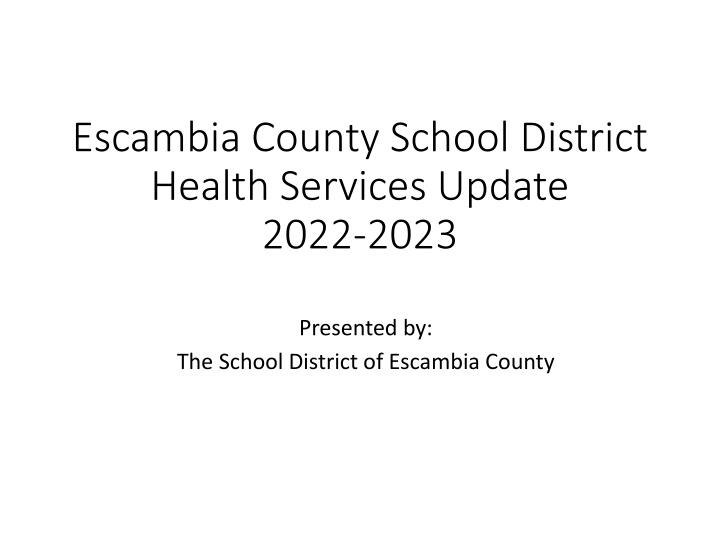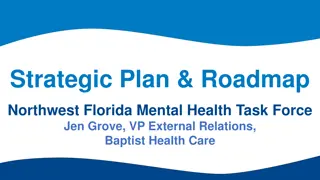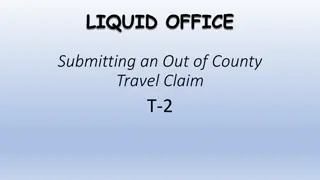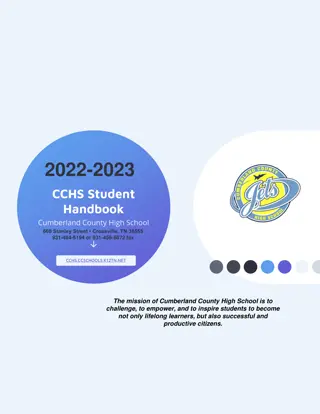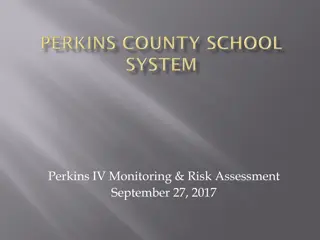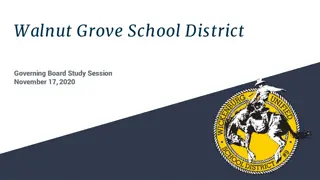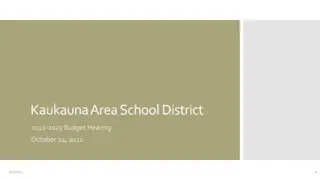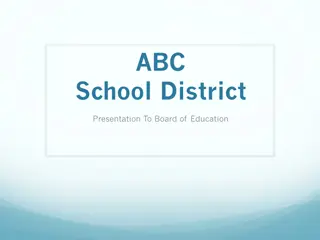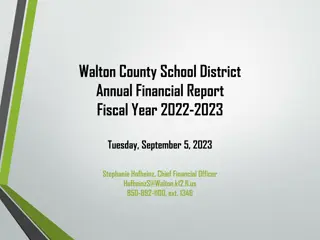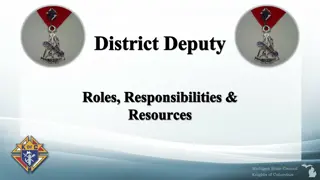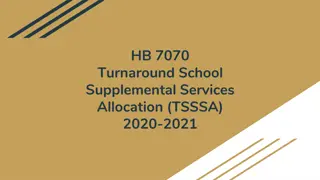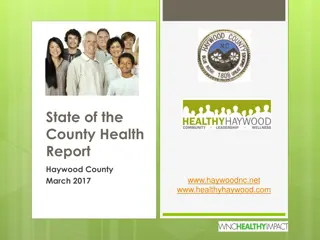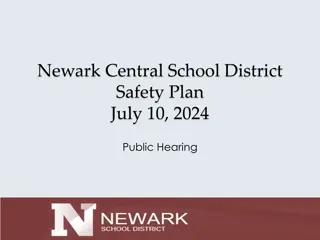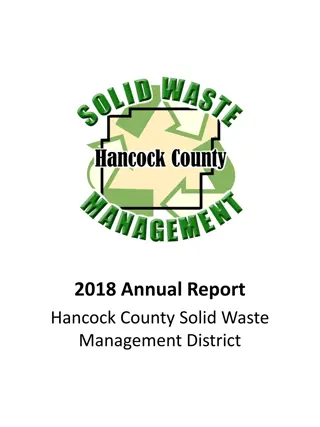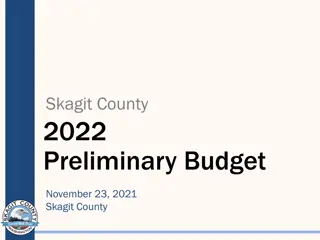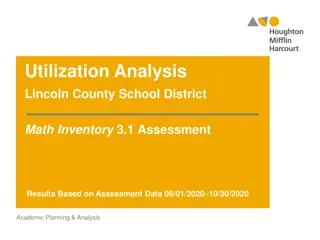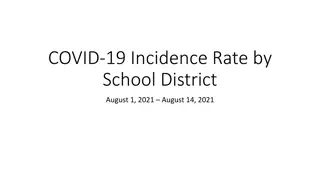Escambia County School District Health Services Update 2022-2023 Overview
This update covers the annual requirements for staff administering medications in the Escambia County School District. Learn about documentation forms, medication policies, procedures, and health guidelines. Understand the process for medication administration and documentation. Access required health forms and online resources.
Download Presentation

Please find below an Image/Link to download the presentation.
The content on the website is provided AS IS for your information and personal use only. It may not be sold, licensed, or shared on other websites without obtaining consent from the author.If you encounter any issues during the download, it is possible that the publisher has removed the file from their server.
You are allowed to download the files provided on this website for personal or commercial use, subject to the condition that they are used lawfully. All files are the property of their respective owners.
The content on the website is provided AS IS for your information and personal use only. It may not be sold, licensed, or shared on other websites without obtaining consent from the author.
E N D
Presentation Transcript
Escambia County School District Health Services Update 2022-2023 Presented by: The School District of Escambia County
Introduction This module is designed for staff who have previously completed the Initial Health Services Workshop in person. This module, post test and check off of skills by RN fulfills the annual update requirement for staff administering medications.
Steps ECSD Staff: 1. 2. 3. 4. 5. Review this module. Return to Health Services webpage to obtain post test. Print and complete the test. Contact school nurse to verify skills and review test results. Store documentation of delegation in medication administration book . Charter or Private School Staff: Follow steps above. You may email or fax the post test to the Health Services Coordinator for a review. You will receive a notice of completion by return email or fax.
OBJECTIVES of MODULE Identify health services documentation forms Review medication policy, procedures and health guidelines Review established procedures for medication administration and documentation
Required Health Forms The Student Health Verification Form This form is printed from the Student Information System (Focus) and sent home for the parent/guardian to review and update health information and allows for opting in or out of each school health service. The parent/guardian needs to sign the emergency care statement annually. Immunization Record Florida DH680 Every student needs a valid Florida DH 680 immunization record. Out of state immunization records are not acceptable. Data must be transcribed onto the Florida form. This can be done at a Doctor s office or the parent/guardian can complete a transfer form and fax it with out of state immunization records to the local Department of Health. It will then be transcribed onto the Florida form. This transfer of records form can be found on the Health Services page of the District website http://escambiaschools.net/health_services School Entry Physical must be dated within 1 year of entry into a Florida school. Out of state physicals may be accepted conditionally subject to the review by the school nurse.
Online Forms escambiaschools.net/health_services Clinic Forms These are forms for day to day management in the clinic. No password is required. Secure Health Forms -Health care providers can contact Health Services Office at 469-5456 for secure forms. Medication Administration Authorizations- Dispersion of Stock OTC Medication Form Dispersion of Medication Form
Rules and Procedures of the District School Board Rules and Procedures of the District School Board Escambia County, Florida School Operations Escambia County, Florida School Operations Medication Policy 3.07(17)(18) Medication Policy 3.07(17)(18) Administration of medication is the responsibility of the parent/guardian unless it is absolutely essential to the wellbeing of the student to receive medication during the school day. The following regulations must be observed when medication (prescription/nonprescription) is to be administered in the schools, including any occasion when the student is away from school property on official school business, i.e., extracurricular activities, field trips, band, and sports activities. A. Stock over-the-counter medications are limited to acetaminophen, calcium carbonate, diphenhydramine, Sting Relief Pad, and ibuprofen. These medications will be stocked in school clinics as available with standing orders from the contracted provider Medical Director. Prior to administration of these stocked over-the-counter medications, the Dispersion of Stock Over-the-Counter Medication Form must be completed and signed by the parent/guardian. This form is valid for one (1) school year, or earlier stop date. For purpose of this policy, cough drops and sunscreen are not considered a medication. Over-the-counter medications will not be administered to pregnant or breastfeeding students without written direction from the student's physician. All other Food and Drug Administration (FDA) approved over-the- counter or prescription medications require a Dispersion of Medication Form completed in its entirety and signed by the parent/guardian. Parent/Guardian Signature must be witnessed by school staff or notarized. Photo identification is required. This form is valid for one (1) school year, or earlier stop date. B. No student will be allowed to have medication, prescription or nonprescription, in his/her possession on school premises, on a school bus, or at a school function, with the exception of epinephrine, diabetes supplies and equipment, pancreatic enzyme, or asthma inhalers as permitted by Section 1002.20(3)(h-k), F.S. with the parent/guardian and physician s signature on the Dispersion of Medication Form. C. Medications that may be administered by medical or trained non-medical school personnel include the following: oral and topical medications, eye, ear, and nose drops, and inhalers. Administration of other types of prescribed medications are evaluated on an individual basis, require child specific training, and appropriate delegation as determined by the professional school nurse. All delegation must be in accordance with the Florida Nurse Practice Act, Chapter 464, F.S. D. Medication must be in the original labeled container. No more than a ninety (90) day supply of the medication may be kept at the school. For student safety it is required that the parent/guardian or a responsible adult deliver the medication at the school. In hardship cases, the parent/guardian must request in writing, and receive approval from the school administrator, for an alternative plan for medication delivery. (17) Administration of Medication to Students
Chapter 3.07(16) continued E. Designated school personnel must attend a workshop in general medication administration and documentation procedures. Following the workshop, the school nurse routinely monitors medication administration and documentation by school personnel. Questions regarding the purpose, effect, expected results, and untoward effects of a medication should be referred to the school nurse. F. Changes in medication require a new Dispersion of Medication Form and medication container. G. Upon receipt, medication will be counted and documented on the Student Medication Record. Medication will be stored under lock and key when not in use. H. Each dose of medication administered will be recorded on the Student Medication Record. When the medication authorization form expires or is changed it will be filed in the student's permanent Cumulative Record. I. In cases where a student is able to medicate him or herself (according to the physician's statement), school personnel will store the medication and generally supervise the student's self-medication. J. Medication will be destroyed if not picked up within one (1) week following termination of the medication authorization form or the end of the school year, whichever occurs first. Medication will be destroyed in a manner in which it cannot be retrieved. Disposal will be witnessed by two persons designated by the principal and documented on the Student Medication Record. K. ALL STUDENT MEDICATION RECORDS WILL BE HANDLED IN A CONFIDENTIAL MANNER.
(18) Administration of Medical Marijuana to Qualified (18) Administration of Medical Marijuana to Qualified Students on District Property Students on District Property Medical marijuana should be only administered on District property during school hours when administration cannot reasonably be accomplished outside of school hours. In those limited circumstances when it is medically necessary, administration of medical marijuana to qualified students on District property shall be in accordance with this policy. A. Definitions For the purpose of this policy, the following definitions shall apply per Florida Statute: 1. Qualified student means a student who is a resident of this state who has been added to the medical marijuana use registry by a qualified physician to receive marijuana for medical use and who has a qualified patient identification card. 2. Caregiver means a person at least twenty-one (21) years of age and a resident of this state who has agreed to assist with a qualified patient s medical use of marijuana, has a caregiver identification card and meets the requirements set forth in Section 381.986(6), F.S. 3. Designated location means a location identified by the District or school administrator in its sole discretion on school grounds. 4. Marijuana means all parts of any plant of the genus Cannabis, whether growing or not; the seeds thereof; the resin extracted from any part of the plant; and every compound, manufacture, salt, derivative, mixture or preparation of the plant or its seeds or resin, including low-THC Cannabis, which are dispensed from a medical marijuana treatment center for medical use by a qualified patient. 5. Permissible type of medical marijuana products means non-inhalable products such as oils, tinctures, edible products or lotions that can be administered and fully ingested or absorbed in a short period of time. Due to the potential for misuse, vapors, patches or other types of administration that continue to deliver medical marijuana to a student while at school are NOT permitted. B. School nurses, healthcare personnel, and District staff are NOT permitted to administer, store, hold or transport the medical marijuana in any type. Medical marijuana will NOT be stored on any District property, including school grounds, at any time. C. Medical marijuana CANNOT be administered to a qualifying student while aboard a school bus or at a school- sponsored event. D. A copy of the qualified student s valid registration form for medical marijuana must be provided to the school.
(18) Administration of Medical Marijuana to Qualified Students on District Property (Continued) (18) Administration of Medical Marijuana to Qualified Students on District Property (Continued) E. An Authorization for Medical Marijuana Use for Qualified Students at School form must be submitted each school year. If there are any changes to the type of preparation of medical marijuana, a new form must be submitted. This form must be signed by the parent/guardian, caregiver, and school administrator. F. Any caregiver seeking access to District property for purposes of the policy must comply with District policy and procedures concerning visitors to schools. G. The caregiver shall be responsible for providing, administering, and then removing the permissible type of medical marijuana from District property. H. At no time shall the qualifying student have the medical marijuana in his/her possession. I. If the federal government indicates that the District s federal funds are jeopardized by this policy, or asks the District to cease and desist the implementation of this policy, the Board declares that this policy shall be suspended immediately and that the administration of any type of medical marijuana to qualified students on school property shall not be permitted. The District will comply with any federal guidance and/or directives related to the policy. The District shall post notice of such policy suspension and prohibition in a conspicuous place on its website. Rulemaking Authority: Sections 1001.41; 1001.42; 1001.43, F.S. Law Implemented: Sections 381.0056; 1001.32; 1001.42; 1002.20; 1006.062; 1013.12, F.S. History: New: 02/25/92. Revised/Amended: 07/22/97; 06/19/01; 11/20/01; 09/23/03; 09/27/04; 05/17/05; 06/21/05; 10/18/05; 06/20/06; 03/26/07; 08/21/07; 12/16/08; 10/27/09; 01/19/10; 04/19/11; 01/22/13; 05/20/14; 07/21/15; 12/12/17; 12/18/18.
Implementation of School Board Medication Policy regarding OTC stock medication: Certain over-the-counter medications are stocked in clinics including: acetaminophen, calcium carbonate, diphenhydramine, ibuprofen and sting relief pad w/2% lidocaine. These medications are stocked, as available, in District school clinics with standing orders from the contracted health services vendor s Medical Director. Prior to administration of these stocked over-the-counter medications, the Dispersion of Stock Over-the-Counter (OTC) Medication Form must be completed and signed by the parent/guardian. This form is valid for one school year, or earlier stop date. This form is available on the District website and may be faxed to the school. For purpose of this policy, cough drops and sun screen are not considered medication. Over-the-counter medications will not be administered to pregnant or breastfeeding students without the written direction from their physician.
Medication Administration Procedures Medication Administration Procedures A Dispersion of Medication Form (9400-HES-005A) must be completed for each prescription/non-prescription medication provided by the parent/guardian. Parent/guardian s signature must be witnessed by school district or clinic staff, or be notarized. If students are to carry and/or self-administer medication* at school or school activities, the Dispersion of Medication Form must be also signed by their healthcare provider. *This is limited to inhalers, epinephrine auto-injectors, pancreatic enzymes and diabetes supplies and medication.
Remember: Administration of medication is the responsibility of the parent/guardian unless it is absolutely essential to the well being of the student to receive medication during the school day. The following regulations must be observed when any medication (prescription/ non- prescription) is to be administered in the school. This includes any occasion when the student is away from school property on official school business, i.e., band, field trips, sports and extracurricular activities.
Medications which may be administered by medical or trained non-medical school personnel include the following: oral and topical medications, eye, ear, and nose drops, and inhalers. Volunteers may not administer medication to students. Administration of other types of FDA regulated medications are evaluated on an individual basis, require child specific training, and appropriate delegation as determined by the professional school nurse (RN). All delegation must be in accordance with Florida Nurse Practice Act, Chapter 464.
Receipt of Medication Medications must be delivered to the school by parent/guardian or other responsible adult. All medications must be counted and documented with parent/guardian or their designee upon receipt and return of medication. Check expiration date of inhalers on the bottom of the canister, Epinephrine on the side of the auto-injector, and Diastat on the syringe, not only the date on the pharmacy label on the box. Oral medications are good for one year after they are dispensed. This date is on the pharmacy label. Document medication expiration date on Student Medication Record. Flag all new authorizations for school nurse to review and sign
Steps For Administering Medications First, wash your hands, then: Identify student, open medication book Verify student s name with authorization form and medication label. Do not offer the student s name. They must identify themselves. If they are unwilling or unable (special needs) to say their name, then an adult must identify them. Always use 2 identifiers such as name and: date of birth, color of pill, student number, etc. Always confirm: Right Student, Right Medicine, Right Dose, Right Time, Right Route, Right Documentation, Right Expiration Date and student has the Right to Refuse* Administer medication and recheck the 8 rights Document on Student Medication Record *Make every effort to administer medication as it is ordered. If student refuses to take medication, contact a parent as soon as possible. Right Dose Right Medicine Right Time Right Student Right Route Right Documentation Right Expiration Right to Refuse
When can a routine (scheduled) medication be administered? Approved window for administration at school is 1 hr before until 1 hr after prescribed time (2 hr window of time) Exception: Medications that must be given at meal times (i.e. Reglan 30 minutes before meals) Any medication given outside of the 2 hour window is a medication error. Use tick sheet to prevent missed doses. Use of tick sheet is NOT optional.
Student Medication Record (SMR) An SMR must be initiated for each student s medication. This is kept in the medication book. Clinic staff will store completed/outdated SMRs by scanning and attaching in the student s Medical Tab in Focus Student Information System and then filing it in student s Cumulative School Health Record or storing it in the clinic forms box in a secure location. To transfer students within the District, scan and attach SMR and Dispersion of Medication Form in student s Medical tab in Focus and them place SMR and Dispersion of Medication Form in student s Cumulative Health Record Folder and send to receiving school. Current SMR s are available in the clinic forms folder online at: https://ecsd-fl.schoolloop.com/health_services
Dispersion of Medication Form The current form is dated July 1, 2021 and is available in school clinics and on the District website: https://ecsdfl.schoolloop.co m/health_services Maintain properly signed Dispersion of Medication Form in the Medication Administration Book.
Current Dispersion of Stock Over-The-Counter Medication Form Revised July 5, 2019 Allows RN (only) to assess and give medication for fever above 102 while awaiting transportation Form is available on District website and in the school clinic
The following slides contain information about the five OTC medications that are stocked in clinics as available. It is important to know this information before administering these drugs to a student. If you have questions, consult with your school nurse.
Acetaminophen (Tylenol) Dosage and Time: Administer according to the manufacturer s label, check for student s age or weight (A label will be available in the clinic for parental viewing if desired) Conditions/Symptoms: For relief of minor aches & pain. Fever (100.4 and above) will NOT be treated at school. (See exception for RN) Possible Side Effects: None significant if administered per manufacturer s label. ALERT Students with temperature of 100.4 or higher must be sent home.
Calcium Carbonate (Tums) Dosage: follow manufacturer's label. Look at the bottle to verify dosage. (A label will be available in the clinic for parental viewing if desired). Conditions/Symptoms: For stomachache or heartburn. Possible Side Effects: Constipation ALERT Be sure to read the label for manufacturer guidelines on minimum age for dosing. Only students 12 and older may have Calcium Carbonate per the label.
Diphenhydramine (Benadryl) Dosage and Time: Administer according to manufacturer s label. Check for dosing by age (A label will be available in the clinic for parental viewing if desired) If you have questions, contact your school nurse. Conditions/Symptoms: For allergy symptoms. Possible Side Effects: Drowsiness or excitability. ALERT Students will NOT be allowed to drive within 4 hours of taking Benadryl.
Ibuprofen (Motrin, Advil) Dosage and Time: Administer according to manufacturer s label (A label will be available in the clinic for parental viewing if desired) Conditions/Symptoms: For relief of body aches & pains or menstrual cramps. Will NOT be used to treat fever (100.4 or above) at school. Possible Side Effects: Stomach upset ALERT Contains no aspirin, but should not be given if student has allergy to aspirin; may cause stomach bleeding.
Sting Relief Pad w/2% Lidocaine for External Use Only Dosage and Time: Administer according to manufacturer s label (a label will be available in the clinic for parent to review upon request) Conditions/Symptoms: For temporary relief of pain and itching caused by insect bites and stings. Possible Side Effects: None significant if administered per manufacturers label. ALERT Do NOT use on broken skin, near eyes or mucous membranes. Available from the District Warehouse Item # 120046
OTC Medications Monitor frequency and pattern of students taking OTC medication. Notify the school nurse if student requests medication 3 days in a row or more than 5 isolated times so that a nursing assessment can be done.
Record Keeping & Reporting Each school is required to maintain a prescription/non-prescription and an OTC medication book. Prescription/non-prescription book contains: Alpha Index Authorization facing the Student Medication Record (SMR) Medication Training Acknowledgement and Competency Checklist Form School Medical Emergency Information Form Copies of CPR/First Aid provider cards Medication Destruction Worksheet Medication Error/Event Form
Record Keeping & Reporting continued Over-the-Counter (OTC) book contains: School Board Medication Policy Standing order from contracted health services vendor Medical Director Stock Medication Inventory (9400-HES-505) Alpha Index Authorization facing each SMR
Errors happen when the 8 Rights are not verified Right student? Right medication? Right dose? Right time? Right route (by mouth, injection, etc)? Right documentation? Right expiration date? Student has right to refuse. (Do not offer this an option, but do not force a student to take medication. Contact parent if student refuses medication). 1. 2. 3. 4. 5. 6. 7. 8. Administer the medication only after you have verified all questions. You cannot safely administer medications without opening the medication book to view the authorizations EVERY STUDENT, EVERY DOSE.
Help prevent wrong dose Messages from parents regarding medication changes should be delivered directly to the clinic staff. If message is received by other personnel, it must be immediately reported to the clinic staff.
Documenting Medication Errors If a medication error occurs, complete a Medication Error form (blank forms are kept in the medication book or are available on the Health Services page of the District website) and submit within 24 hours to Health Services Coordinator (fax 469-5346). Medication errors and adverse reactions must be documented on Student Treatment Record by health staff. District staff use the Daily Visit Log in Focus Student Information System Alert: Notify principal, school nurse, parent (and physician if indicated) of error or event.
Responding to Medication Emergencies Responding to Medication Emergencies Never leave student alone Notify parent and principal immediately, and school nurse if available Initiate 911 call, if indicated If student is sent to emergency room, send a copy of student s emergency contact information Document on SMR comment section on back of page - Health staff will document in Daily Visit Log of Focus
Emergency Evacuation Plan Emergency Evacuation Plan Review Emergency Evacuation Plan with School Nurse/Principal to identify your role. Take emergency medication and medication book when evacuated. Plan is to be posted in the front office and clinic
Documenting Medical Events If a serious medical event occurs, particularly if 911 is called, contact the District Health Services Coordinator at 850-469-5456. Then complete a Medical Event Form (blank forms kept in the medication book or are available on the Health Services page of the District website) and fax it to the District Health Services Coordinator at 469-5346.
Disposal of Medication Discontinued medication are to be picked up by parent/guardian or designated adult within one week of the stop date. Notify parent/guardian to pick up medication by the last day of school year. Make every effort to contact the parent prior to destruction of medication. Medication must be destroyed in a manner that it cannot be retrieved. DO NOT FLUSH. Destruction must be witnessed by 2 persons (1 clinic and 1 District staff) and documented on SMR (legal record) and the Destruction of Medication Log. The Destruction of Medi cation Log is kept in the Medication Book.
Responsibilities Regarding Medication Responsibilities Regarding Medication and Medical Diagnosis and Medical Diagnosis School Personnel Do Not: Suggest or diagnose any health condition. Recommend a specific health care provider. Recommend medication or treatment. Exclude any student for not having medication. Contact medical provider to recommend diagnosis or treatment for student. School Personnel Do: refer student health information and issues to the school nurse.
Other Responsibilities Regarding Other Responsibilities Regarding Medication Medication Do not use white out for corrections: Draw line through error and initial above the line. Make correct entry. Keep medication cabinet and key secured: Medication carts or cabinets must be locked unless staff is retrieving medication. If you leave the room, or leave sight of medication cart or cabinet, it must be locked. Locking the clinic door is not sufficient. Each school must have a plan for managing key security during the school day and after hours. Clinic staff do not take medication cart keys home after school hours. Refer health questions to school nurse.
Confidentiality Confidentiality In the course of caring for a student, information of a private or personal nature may be divulged. It is imperative that you keep in confidence such information; this is an ethical and legal standard that must be upheld. Before sharing any information with any staff member, stop and ask yourself, Does this person have a legitimate educational need to know? Do not discuss students health information with others who are not directly involved in care.
Medication Audits Performed throughout the year by the school nurse to monitor administration of medications and identify procedural problems. A minimum of one audit per semester is required. Medications on hand are counted during audit and counts reconciled. Medications are counted at the start of each month and the total is listed in the Medication Count section. This only requires one signature.
Common Policy Issues Common Policy Issues Do not administer any medication without a signed authorization. A verbal request is not acceptable. - Do not accept parent s request to alter physician s order; a new pharmacy labeled container must be provided. Parent always has option to come to school and administer medication. - Do not assume a student has an authorization, always look at the authorization prior to administering medication, including stock medications. Do not administer OTC medication dose greater than the stock medication label per standing order. Do not administer non- FDA regulated medications or products (ie essential oils, medication from another country etc.) If in doubt, contact your school nurse. You need to know what you are administering and its possible side effects.
Field Trip Procedures Field Trip Procedures District staff submit completed REQUEST FOR NURSING SERVICES ON FIELD TRIP/COMMUNITY-BASED INSTRUCTION TRIPS form to the Health Services Coordinator for students who need health assistance on a field trip (fax # 850-469-5346). Notify School Clinic Staff of all planned field trips as soon as possible (see District Form). Field trip guidelines and forms are available from your Principal. All medication administration policies and procedures must be followed during field trips and extra-curricular activities.
Infection Control Guidelines Infection Control Guidelines Handwashing is the best defense against infection for you and the student Use anti-bacterial soap Use hand sanitizer only if soap and water is not available Change cot paper between students Clean frequently touched surfaces and cots with Sanizide plus spray or other approved disinfectant (available in the District warehouse) Do not use bleach as it may stain clothing/shoes and may be inadvertently mixed with ammonia cleaning products Clinic is to be cleaned daily by custodial staff trash should be removed daily and as needed
Universal Precautions Universal Precautions Treat ALL blood and other body fluids as potentially infectious. Maintain disposable plastic Sharps Container Clean surfaces with Anti-TB Sanizide Plus, GE Fight Bac, or other District approved disinfectant (available from the Warehouse) Wear gloves whenever handling body fluids Use appropriate Personal Protection Equipment Wash hands after removing gloves
Sharps Container Disposal Sharps Container Disposal Seal and date container when full of sharps. School Health personnel will contact school health vendor to dispose of sharps container. If saturated material is placed in container: Date container and start 30 day clock. Seal container on 30th day. Contact Nurse to arrange transport of sharps container for disposal.
Medical Guidelines Medical Guidelines Guidelines for managing Severe Allergies, Asthma, Diabetes, or Seizure Disorders are found on the District website Health Services page: https://ecsd- fl.schoolloop.com/health_services
Medication Related Emergencies Medication Related Emergencies An allergic reaction to a medication can occur at any time, no matter how long the student has been taking medication. Allergic symptoms: Rash Swelling and Itching Breathing problems Bluish color of skin Increasing anxiety
Anaphylaxis Anaphylaxis Medical term for life-threatening systemic allergic reaction that may occur when allergic individuals are exposed to specific allergens. Anaphylaxis is a collection of symptoms affecting multiple systems in the body. Epinephrine (adrenaline): single most important medication for treating anaphylactic reactions; should be administered at the first sign of a systemic allergic reaction. If epinephrine is given, call 911.
Anaphylaxis Signs & Symptoms Anaphylaxis Signs & Symptoms Hives, itching (of any body part); Flushed, pale skin, dizziness; Swelling (of any body part); Red, watery eyes, runny nose; Fainting, or loss of consciousness; Wheezing, coughing, difficulty breathing; shortness of breath; Change in mental status; increasing anxiety Throat tightness or closing; difficulty swallowing. Nausea, vomiting, abdominal pain
Asthma Asthma Students often have orders to administer an inhaler before P.E. If a student states they need their inhaler, and it is in the clinic with proper authorization, allow student to use it. Notify parent. Do not withhold an inhaler because of lack of a cough or lack of obvious difficulty breathing.
